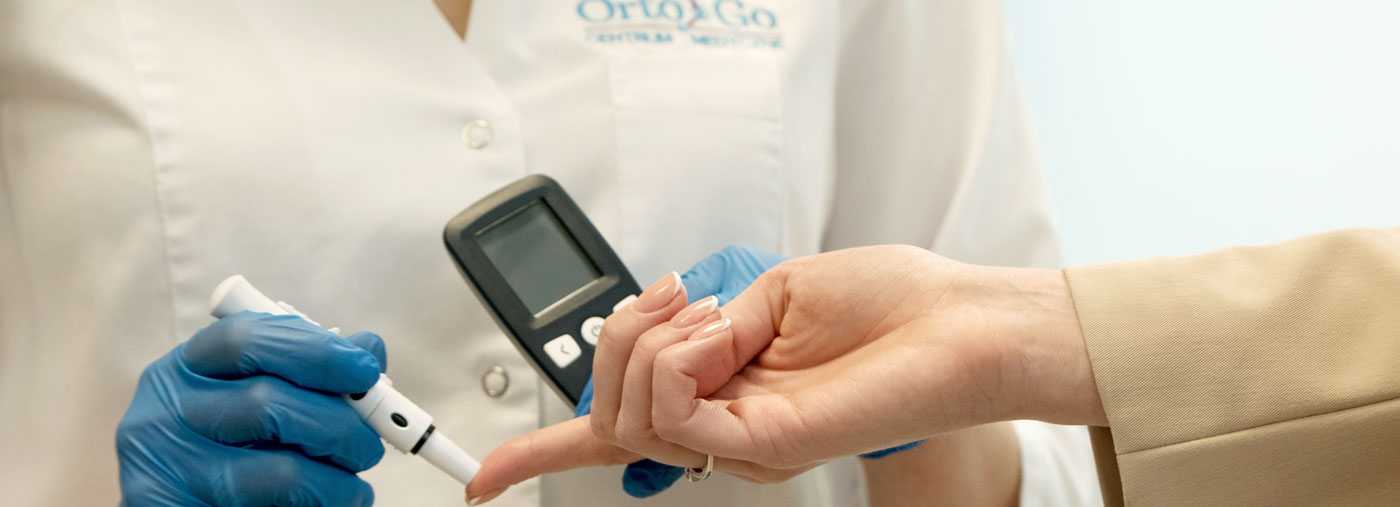Diabetologist Warsaw and Płock - Diagnostics and Treatment
See also: Endocrinology, Neurology, Cardiology, Hypertension medicine, Blood collection point - laboratory tests.
Diabetology is a field of medicine that, under the guidance of a diabetologist, focuses on diagnosing and treating diabetes and other metabolic diseases. The diabetologist, as a specialist, provides the necessary knowledge and skills to help patients manage chronic conditions, and diabetology offers tools for a deeper understanding of this disease. Consult with a diabetologist at the OrtoGo Medical Centre in Warsaw or Płock.
What does a diabetologist do?
Diabetology is a medical specialty focused on the study, diagnosis, and treatment of diabetes. Diabetes is a chronic disease that affects millions of people worldwide, and its complex mechanisms and associated complications make it one of the major challenges in modern medicine. This is where the role of a diabetology specialist - an expert in this field - comes into play.
A diabetologist is not just a doctor who prescribes medication and monitors blood glucose levels. This specialist understands the full range of issues related to diabetes. Diabetology requires a deep understanding of hormonal mechanisms, metabolic processes, and their impact on the entire body.
Often, diabetes does not occur in isolation. It is associated with other conditions such as hypertension or heart disease. Therefore, diabetology encompasses a broad knowledge base that allows the diabetologist to assess the overall health status of the patient. Proper diabetes treatment requires not only blood sugar control but also managing other potential health risks by the diabetology specialist.
Another important aspect of diabetology is patient education. Patients need to understand how their daily habits, such as diet, physical activity, and medications, affect their health. Therefore, diabetology places a strong emphasis on education and self-management, helping patients understand their disease and actively participate in their treatment.
What diseases does a diabetologist diagnose and treat?
Diabetology deals with disorders related to carbohydrate metabolism in the body. A diabetologist diagnoses, treats, and monitors patients with metabolic disorders such as:
- Type 1 diabetes: A disease where the immune system attacks and destroys insulin-producing beta cells in the pancreas. Diabetology focuses on providing patients with appropriate insulin doses and educating them on self-management.
- Type 2 diabetes: The most common type of diabetes, associated with impaired insulin production by the pancreas. Treatment includes lifestyle modifications, oral medications, and in some cases, insulin therapy.
- Gestational diabetes: Occurs in some pregnant women and typically resolves after childbirth. Diabetology helps monitor and control blood glucose levels during pregnancy.
- Obesity: Strongly linked to insulin resistance.
- Insulin resistance: A condition where the body does not respond properly to insulin, leading to elevated blood glucose levels.
- Reactive hypoglycemia: Characterized by low blood glucose levels after a meal. Diabetology focuses on educating patients about appropriate diet and lifestyle choices.
Diabetology provides diagnostic tools that allow for precise monitoring and control of these conditions. This enables diabetologists to deliver high-quality care focused on improving patients' quality of life. Collaborating with a diabetologist is crucial for anyone with carbohydrate metabolism disorders, and diabetology offers numerous treatment options and support.
Indications for visiting a diabetologist – when should you go?
Diabetology, as a specialized field of medicine, focuses on identifying and treating various metabolic disorders. Modern diabetology allows for early detection of diseases and effective treatment, minimizing the risk of complications. Many patients may not be aware of symptoms that could indicate carbohydrate metabolism issues. Therefore, it's important to recognize the signs that should prompt us to visit a diabetologist.
It's advisable to consult with a diabetology specialist if you experience troubling symptoms such as:
- frequent thirst.
- frequent urination.
- persistent hunger.
- dry mouth.
- unexplained weight loss.
- vision problems.
- constant fatigue.
- persistent drowsiness and difficulty concentrating.
- apathy - lack of interest in daily activities.
- general body weakness.
Diagnosis in the field of diabetology has become more precise, leading to more effective treatments. Anyone experiencing the mentioned symptoms should consult a diabetologist as soon as possible.
Diabetology not only focuses on treatment but also educates patients on preventive measures. Knowledge about one's own condition and awareness of potential complications are key to improving quality of life. Remember, diabetology is here to help you, and the diabetologist will guide you through the treatment process and health maintenance. To consult with an experienced diabetologist, consider using the services of OrtoGo Medical Centre in Płock or Warsaw.
What does a visit to a diabetologist look like?
At the beginning of a visit to a diabetologist, the patient presents a complete set of previous tests. In diabetology, data accuracy is crucial, so every test result, even seemingly insignificant ones, can be helpful. Results related to blood glucose levels are of course the most important, but diabetology also emphasizes other parameters such as blood pressure, body mass, and heart function.
Next, the diabetologist conducts a detailed medical interview. Diabetology places a strong emphasis on understanding the patient's daily life, dietary habits, and experienced symptoms. Therefore, it's important to monitor and record blood sugar levels accurately for several days before the visit.
Based on the interview, the doctor decides on further treatment. Diabetology offers various forms of insulin therapy tailored to the patient's individual needs and utilizes the latest technological advancements, such as modern glucose monitoring devices and advanced insulin pumps. Treatment involves not only medications but also education. The diabetologist provides dietary recommendations, demonstrates how to measure blood sugar levels correctly, how to respond to any abnormalities, and how to effectively use available self-management tools.
Diabetology recommends regular follow-up visits where the doctor assesses progress in treatment, adjusts medication doses, and refers the patient to other specialists if necessary. Collaboration with a diabetologist is fundamental to effective treatment and improving the patient's quality of life.
Diabetology at OrtoGo Medical Centre
We encourage you to take advantage of a consultation with a diabetology specialist at OrtoGo Medical Centre. In Warsaw and Płock, our top specialists await to provide you with the highest quality medical care.
In the field of diabetology, we offer:
- comprehensive diagnostics and treatment of diabetes
- diabetology consultations
- paediatric diabetology consultations
- qualification of individuals with diabetes for surgical procedures
- issuance of necessary documents for the Social Insurance Institution (ZUS), Agricultural Social Insurance Fund (KRUS), Insurance Companies, Disability Assessment Commissions
Have you got questions? Get in touch with us - 22 100 45 20 or 24 337 62 66.
You can check the cost of consultations in the field of diabetology and other services in our price list.

